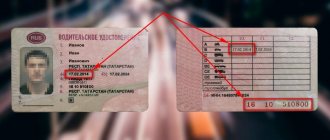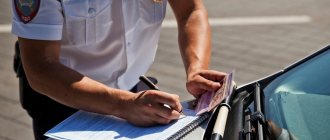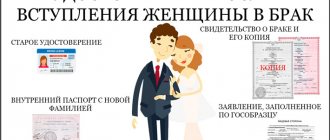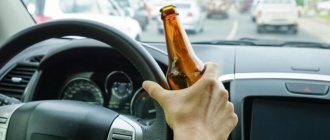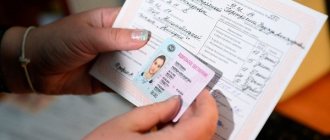Such a measure as depriving a driver of the right to drive a vehicle is gaining momentum. And the reason for this is not only the desire to correct a traffic offender and stop the commission of new offenses, but also to maintain law and order and stability of traffic. Various actions that grossly violate the rules of transport management can lead to deprivation of rights. How long can you drive a car after revocation of your driver's license? Is it possible to travel for 10 days until the court decision has entered into legal force? Is it possible to continue driving a car if an appeal has been filed against the court decision? We will answer these questions in this article.
Is it possible to drive before the deprivation trial?
Of course yes. The fact is that such a punishment as deprivation of a driver’s license is imposed only by the court. A traffic police officer on the road can only draw up a report, thereby opening a case. And in court the case is considered, and only within the framework of the consideration the punishment is assigned.
Now, until the punishment is imposed, you obviously cannot be found guilty. Accordingly, you are allowed to drive a car before the trial.
But keep in mind that if you commit the same violation a second time during this time, the terms in this case will be added up. That is, there will already be 2 trials waiting for you, and at each they will issue a ruling. For example, if the first one assigns 2 months of deprivation of rights, and the second - 1.5 years, then the total period will be 1.7 years: first the two-month period of deprivation will expire, and immediately after it the one and a half year period will begin.
What to do if you have already been deprived of your driver's license?
If a person tries to find loopholes, then this already indicates that the offender is not going to change behavior and comply with the law when driving.
In this case, everything can end sadly, even with a pedestrian being hit. This is no longer an administrative, but a criminal offense. You could very well end up in jail for this. But it turns out that driving without a license is still possible. There is a certain period of time between the unpleasant conversation with the inspector and the confiscation of the driver’s license by the court. Sometimes, this time can even be very long if the court hearing, for example, is held in another region.
Is it possible to drive a car after deprivation?
Yes. And the Code of Administrative Offenses provides such an opportunity.
However, the problem is that nowhere in the laws of 2021 will you find a definition of “deprivation of rights,” as well as, in principle, a direct condition that a separate license is required to drive a car. This follows directly from the Federal Law on Road Safety.
However, today there is a punishment in the form of deprivation of the right to drive. During the period of this liability imposed on you, you are not allowed to drive any vehicle.
And the key to the question of whether it is possible to drive a car after being sentenced to deprivation of rights lies in the period of punishment. And Article 4.6 of the Code of Administrative Offenses of the Russian Federation indicates that this period is calculated from the date of entry into force of the decision (of the court in our case).
Thus, all events and actions after deprivation generally occur in the following order.
- The magistrate's court issued a punishment order.
- You have a period to appeal this decision, during which you can continue to drive the car, despite the fact that you have already been sentenced.
- At the end of the allotted period for filing a complaint, the decision comes into force, and you are considered subject to punishment - the period for deprivation of your driver's license has begun.
- From this day on, you must surrender your driver’s license to the traffic police at the place where the punishment is executed (it is indicated by the court in the decision) within 3 days or write a statement about its loss.
- If you do not do this, the period of deprivation will be interrupted, and will begin only when you actually pass the certificate or write an application (that is, if you did not hand over the certificate, then according to the law, only 3 days of deprivation have passed). We'll talk more about this point below.
- After half the term, you need to pass a traffic knowledge exam.
- Next, get a medical certificate if you were deprived of one of the articles for drunkenness or refusal to be examined (12.8, 12.26 or 12.27).
- After this and the expiration of the license deprivation period, you can return the license, and from that moment you can drive a car again.
You will also be interested in:
- New fine for stopping and parking on the lawn - true or not?
- What are the penalties for repeated violations and how long does the repetition last?
- 20 day pass for fine discount - can I pay 50%?
Is it possible to drive a vehicle without a driver's license?
If a citizen has not yet received his driver’s license back, then he cannot drive . To do this, you need not only to return the legal right to drive transport, but also to have a document confirming this right. A driver's license is such a document. So, if the sentence of a negligent driver has expired, this is not enough. You must pick up your license and only then sit in the driver’s seat.
Lawyer's comment
Case from practice
How many days?
In general cases - unless you appeal the deprivation order of the Magistrates' Court - you have the right to drive a car for 10 days.
Where does this conclusion come from? Everything is very simple! We indicated above that deprivation as an administrative penalty begins on the date the court decision comes into force. And it comes into force after the expiration of the period allotted for appealing it (Article 31.1 of the Administrative Code):
A decision in a case of an administrative offense comes into force: 1) after the expiration of the period established for appealing a decision in a case of an administrative offense, if the said decision has not been appealed or protested...
At the same time, Article 30.3 of the Code establishes that the period for challenging a punishment is 10 days:
1. A complaint against a decision in a case of an administrative offense may be filed within ten days from the date of delivery or receipt of a copy of the decision.
Please note that the starting point is the day following the day you received a copy of the resolution. And here there are 2 options:
- if you were present at the trial, then the order could be issued to you immediately, and 10 days for the possibility of driving a car began from the next day,
- if you were sent a copy by mail, then the period begins from the next day after you receive it - this day will be indicated in the mail and handed over to the court.
In the same case, if you have not received a copy of the decision, then after 7 calendar days of storage at the post office (clause 34 of the Rules for the provision of postal services) it is returned to the court, and on the next day after the return the 10-day countdown period begins - clause 29.1 Resolution of the Plenum of the Supreme Court No. 5 of March 24, 2005.
Moreover, according to Article 4.8 of the Code of Administrative Offenses, if any period of time is established, then its beginning is considered the next day after the beginning. That is, if, for example, you received a copy of the resolution on May 29, 2021, then the countdown of the period when you can drive a car begins from tomorrow.
Expert opinion
Dmitry Tikovenko
Automotive law expert. 7 years of experience. Areas of specialization: civil law, disputes over compulsory motor liability insurance and road accidents
By driving a car after you have been deprived of your license, you risk not only receiving a new period of deprivation, but also paying for it in rubles in the event of an accident through your fault, even if you have an MTPL policy.
Subparagraph “c” of paragraph 1 of Article 14 of the Law on Compulsory Motor Liability Insurance provides for the right of the insurer to recover everything paid to the victim from the culprit if at the time of the accident he did not have the right to drive the vehicle. This, by the way, applies not only to cases of deprivation of a driver’s license, but also to cases where a driver’s license was not obtained at all.
Ask a Question
Examples
Let's look at a couple of examples.
- The driver was deprived of his license on March 10, 2021 - this is the date when the trial took place. The motorist was present at the trial, and he was given a copy of the decision immediately that day. Then the countdown of the appeal period begins on March 11. The driver can drive a car until March 20, but from the 21st it is no longer possible.
- The trial was on April 18, 2021. The driver was not in court, and he received a copy of the decision by mail on May 5. That is, the period before entry into force began on May 6 and lasts until the 15th. From the age of 16 he is prohibited from driving.
- The Magistrate's Court made its decision on May 16, 2021. The driver was sent documents by mail, but he avoided receiving them. For example, on May 21, the documents arrived at the post office and a notice was sent to the driver. But, since he did not appear for them, they were sent back to court - this happened on May 29. On June 7, the documents arrived in court. Accordingly, the driver can drive a car after being sentenced to deprivation of rights from June 8 to June 17 inclusive.
Thus, if you have not filed an appeal against the ruling of the court of first instance (magistrate, as a rule), then you have 10 days to drive a car. And this period may still be extended for two reasons. Let's look at them below.
If the deadline falls on a weekend
According to the general rule for imposing administrative penalties, if the last day falls on a weekend, the period is automatically extended until the first working day.
But in our case there is a big catch. It is hidden in Article 4.8 of the Code of Administrative Offenses on the calculation of deadlines. Here you can see that they are calculated in either days or days. And in part 3 of this norm it is stated that this period is “moved” if the last day is a non-working day.
However, this applies for a period calculated in days. Let's return to Article 30.3 and see that here we are talking about the fact that you can drive a car for 10 days, not days. Does this mean that this extension of the period does not apply to our case? Not at all.
Several official sources give a clear answer.
- Review of judicial practice for 2008: in question No. 16, the Supreme Court explains that since the Code of Administrative Offenses does not regulate this issue, then in this case an analogy of law enforcement is acceptable, and one must be guided by the general rule - if the last day is a non-working day, then the period is extended.
- The Supreme Court made the same claim in much more recent case law, ruling in favor of the driver.
- And the same opinion is shared by the official department of the Ministry of Internal Affairs of the Russian Federation.
Let's look at 2 more examples.
- The court issued a ruling against the driver to deprive him of his license on March 10 and on the same day handed him a copy of the ruling. The countdown for the appeal period began on March 11 and lasts until the 20th, which falls on Saturday. Then this period is extended until the first working Monday - March 22, until this day the driver can drive a car after deprivation.
- The decision was issued on April 2, and a copy of it was sent to the motorist on the 10th. He received it on April 21. The period for challenging the punishment began on the 22nd and lasts until May 1. But this year, the period from May 1 to May 12 is recognized as non-working holidays. In this case, the end of the period is postponed until May 13 - until this day the driver has the right to drive.
Expert opinion
Yuri Panchenko
Driving instructor, human rights activist, author of books. 10 years of experience.
I would like to draw your attention to two points.
- Some drivers, after being deprived of the right to drive, do not surrender their driver’s license, but also do not get behind the wheel. In this case, the period of deprivation is interrupted until the driver’s license is handed over or until a statement about the loss is written. Several years pass, and suddenly the need arises to use the car again. In this case, on the one hand, the period of deprivation of the right to drive has not yet begun, on the other hand, the statute of limitations for execution of the punishment (three years) has expired. In this case, in order to stop the execution of the punishment, the driver must apply to the court that issued the decision to terminate its execution.
- If a driver is twice deprived of the right to drive, the terms of deprivation do not always add up. If the first decision is made, but has not yet entered into force (10 days have not passed), and at that moment the second decision is made, then the terms of deprivation run in parallel. In order for the traffic police to take this point into account, it is again necessary to contact the court that issued the decision so that it clarifies that the deadlines are running in parallel.
Ask a Question
When can I extend it even further?
In the same case, if you filed a complaint against the decision, this period is extended until the decision of a higher authority in your case is announced.
The subtlety here is that the ruling does not come into force when you appeal it. Consequently, the period when you are allowed to continue driving a car after deprivation of your license is extended even further - until a decision by a higher court.
But there is bad news here: the decision of a higher authority comes into force immediately after announcement. This is established by Article 30.19 of the Code of Administrative Offenses of the Russian Federation. Although the good news for drivers is still more significant - it turns out that several months may pass from the date of the ruling by the magistrate court to the decision of the district or city on the complaint. During this entire time you can drive a car.
And again, using an example - now it’s the hardest part.
- The magistrate's court issued a ruling on the deprivation of a driver's license on April 15. The documents were sent to the driver by mail the next day.
- The deprived person received them on April 23 and on the 27th appealed to the district court at the place where the violation was committed.
- A hearing on the complaint is scheduled for June 1. And the judge upheld the decision - that is, did not cancel the deprivation of rights.
- As a result, the judge's decision came into force on June 2. And the driver could drive from April 15 to June 1.
Please note that since the court ruling in this example did not come into force during this time, the period of deprivation did not begin. Thus, if you are delaying this date in order to continue driving the car, then keep in mind that the end of the period of deprivation of rights is also delayed by exactly the same period.
In the above situation, if the driver, for example, was deprived of the right to drive for 3 months, then in the absence of his complaint, the period of deprivation would have expired on July 24. And taking into account the appeal, this deadline has moved to September 2.
About the statute of limitations for attraction
It would seem that, taking into account all the examples listed above, you can avoid punishment if you do not receive a copy of the resolution for a long time. Then the statute of limitations for prosecution will expire.
It amounts to (according to Article 4.5 of the Administrative Code):
- 3 months (for most violations considered by the judge),
- 1 year, if we are talking about prosecution under one of the articles: 12.8 (for driving while intoxicated), 12.24 and 12.30, part 2 (for harm to health when the driver or pedestrian is at fault in an accident, respectively), 12.26 (refusal of examination).
However, the statute of limitations is considered from the date of violation (drawing up the protocol) until the very first decision of the magistrate’s court on deprivation of rights. That is, if, for example, a driver was caught drunk on March 10, 2021, then if the punishment is imposed before March 10 of the following year, then it is considered legal. And appeal does not play any role here (paragraph 14 of the Resolution of the Plenum of the Supreme Court).
If you committed the same violation
Then the terms of deprivation of rights are summed up. This only works if you are driving the vehicle legally after the disqualification trial but before it takes effect.
Let's look at an example. The driver drove into the oncoming lane in violation of traffic rules on March 10, 2021. On March 22, a court was held, which imposed a punishment for this in the form of imprisonment for 4 months. On March 25, the driver was caught drunk. The second court ruling was issued on March 30 with deprivation of rights for a period of 2 years. In this case, the total period will be 2 years and 4 months.
If the first resolution came into force, and the driver committed the same violation, then there may be a repetition. For example, for 2 consecutive driving into oncoming traffic, when the first punishment is already in force, the second one will be imprisoned for 1 year (Part 5 of Article 12.15 of the Administrative Code). And in the case of driving while intoxicated, the driver may face imprisonment (Article 264.1 of the Criminal Code of the Russian Federation).
Speaking of criminal liability...
What about on a bicycle?
A bicycle, according to the same definition in the Rules, is also a vehicle. But, since we are talking about administrative legislation, we are interested in the possibility of applying punishment for riding a bicycle after deprivation of rights. Therefore, we return again to the Note of Article 12.1 of the Code of Administrative Offenses of the Russian Federation.
And here we can understand that since there is no special right granted to a bicycle without a motor, then we have every right to ride it even if deprived.
This also includes any other funds for which management rights are not granted:
- scooters,
- roller Skates,
- Segways,
- hoverboards,
- unicycles
- and similar devices.
The electric scooter deserves special attention. Nowhere in the law will you find that rights are required for it. However, in judicial practice there are often cases of equating them to motorcycles (they can also have an electric motor according to traffic regulations).
That is, driving any device with an electric motor or internal combustion engine may result in a driving penalty by having your license revoked. This doesn't just apply to electric scooters.
Is it possible to drive after a trial if you have been deprived of your license under a criminal article?
Yes. And here everything works almost the same as in administrative law, and with the same deadlines.
- Article 390 of the Code of Criminal Procedure of the Russian Federation prescribes that the court's verdict comes into force upon the expiration of the appeal period.
- 389.4 indicates that an appeal can be filed within 10 days.
Thus, when deprivation of a driver’s license is imposed under the Criminal Code, you can also continue to drive a car for 10 days after the court verdict (as well as before the trial).
We are talking about deprivations under Article 264 of the Criminal Code of the Russian Federation for serious harm to health or death of people in an accident, including in the case of fleeing the scene of an accident or being intoxicated.
There is also article 264.1 - if a driver is caught on the road, having been punished for intoxication or refusal to be examined, then this criminal article is applied for repeated drunk driving. And here the situation with the ability to travel is ambiguous:
- if the driver was caught during the period of deprivation of rights under the first administrative resolution and after it came into force, then you cannot drive, since the first punishment is still in effect,
- but they can be charged under this article even after the expiration of the period of deprivation of rights (remember, being subject to punishment lasts for another year after the end of the period) - in this case, the driver has a license, you can drive for 10 days after the trial and as long as you like before the trial.
Something else useful for you:
- Everything about electric scooters in questions and answers: rules, fines and the latest news
- Will I have to pay double the fine? Calculation procedure
- What is the size of the fine for deprivation of rights: repeated, for drunkenness and oncoming traffic?
What's the threat?
If you missed the deadline, did not know about the completed trial and the decision made, or simply decided to get behind the wheel despite the deprivation of your rights, then liability may be provided for by several provisions of the law.
- driving a car while deprived of a license (with a punishment order in force) is subject to a fine of 30,000 rubles, or arrest for up to 15 days, or compulsory work from 100 to 200 hours (part 2 of article 12.7 of the Administrative Code),
- if at the same time you find yourself in a state of intoxication and are deprived of more than one article for intoxication or refusal to undergo an examination, then the punishment will be harsher - arrest from 10 to 15 days (or a fine of 30 thousand if it is prohibited to apply arrest to you) - in part 3 articles 12.8,
- If for the first time you were deprived of the right to drive for drunkenness or refusal of a medical examination, and again you were caught drunk, then you will face the above-mentioned Article 264.1 of the Criminal Code of the Russian Federation.
And don’t forget to hand over your driver’s license within 3 days after the deprivation order comes into force. Otherwise the deadline will be interrupted. We described how to do this correctly so as not to get caught by the traffic police in one of our previous articles.
Amounts of fines
| Type of violation | Punishment for the first instance of non-compliance with the rules | For repeated violation |
| Using a vehicle for its intended purpose while intoxicated | Fine 30 thousand rubles. and confiscation of driving license for a period of 36-48 months. | Fine from two hundred to three hundred thousand rubles. or compulsory work for a period of up to 20 days or forced labor for a period of up to 24 months or imprisonment for up to 24 months, and mandatory confiscation of driving license for 36 months is also applied to criminal punishment. |
| Driving into oncoming traffic separated by a solid lane | Fine 5 thousand rubles. or confiscation of driving license for up to six months | Deprivation of the right to drive a vehicle for a year, and if the violation is photographed or video recorded, a fine of 5 thousand rubles will be imposed. |
| Leaving the scene of an accident by a violator | Deprivation of rights for a period of one year to 36 months or up to 15 days of arrest | Collection in the amount of up to 300 thousand rubles. or compulsory work for a period of up to 480 hours or forced labor for a period of up to 24 months or arrest for up to two years, and confiscation of driving license for three years is also applied to criminal punishment |
| The intersection of two solid | Fine up to 5 thousand rubles. or confiscation of driving license for up to six months | Confiscation of driving license for a period of twelve months or a fine of 5 thousand rubles, if the violation was recorded using photo or video recording |
| Overtaking on a section of the road where a corresponding prohibition sign is installed | Fine 5 thousand rubles. or confiscation of driving license for up to six months | Confiscation of driving license for one year or a fine of 5 thousand rubles, if the violation was recorded using photo or video recording |
| Driving oncoming traffic on a one-way road | Fine 5 thousand rubles. or confiscation of driving license for up to six months | Confiscation of driving license for one year or a fine of 5 thousand rubles, if the violation was recorded using photographic material or video recording |

